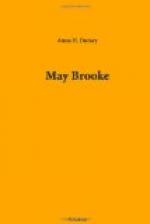When Mr. Stillinghast came down that morning, everything was bright and comfortable in the sitting-room. A clear fire burned in the grate; the toast and coffee sent up an inviting odor; and the table was spread with the whitest of linen, on which the cups and saucers were neatly arranged. The morning paper was drying on a chair by the fire, and over all, flickered the glorious sunshine, as it gushed like a golden flood through the clustering geraniums in the window.
“Good morning, sir!” said May, blithely, as she came in from the kitchen with a covered plate in her hand.
“Good morning,” he growled; “give me my breakfast.”
“I thought you’d like a relish for your breakfast, sir, and I broiled a few slices of beef; see how very nice it is,” said May, uncovering the plate, and placing it before him.
“Humph! well, don’t do it again. I cannot afford such extravagance; I must curtail my expenses. ’Gad! if I should have another beggar thrown on my hands, we must starve,” he said, bitterly.
May did not relish this speech at all; up rose the demon, pride, in her soul, instigating her to a sharp retort, and vindictive anger; but she thought of Bethlehem, and grew calm.
“I hope not, sir,” she said, gently. “You have cast bread on the waters; after many days it will return unto you—perhaps in an hour, and at a time, dear uncle, when it will be much needed.”
“Fudge, fudge!” he said, testily; “I—I cast bread on the waters, do I? Well, I am doing what is equally as foolish—it is truly like throwing bread into a fish-pond; but where’s what’s her name?”
“She slept poorly last night, and I would not awaken her this morning,” said May, diverted in spite of herself.
“How do you know she didn’t sleep, pray? did she tell you so?”
“No, sir; I heard her weeping all night, and, indeed, sir, I hope you’ll speak kindly to Helen when you come in this evening, because she feels so very sorrowful on account of her recent losses, and—and—”
“And what, Miss Pert?”
“Her dependence, sir!” said May, bravely.




